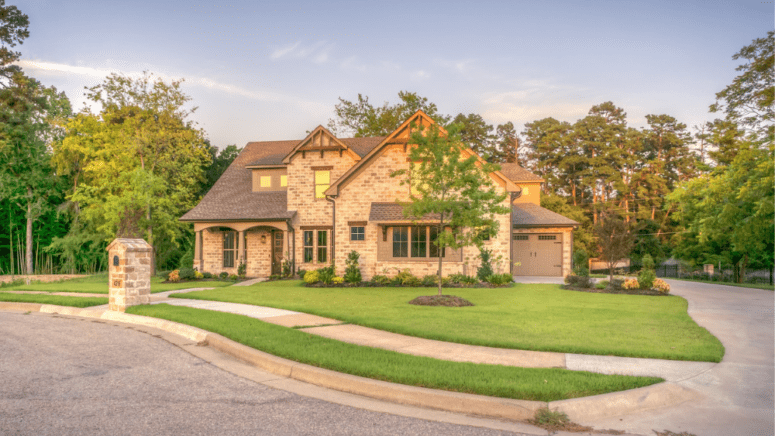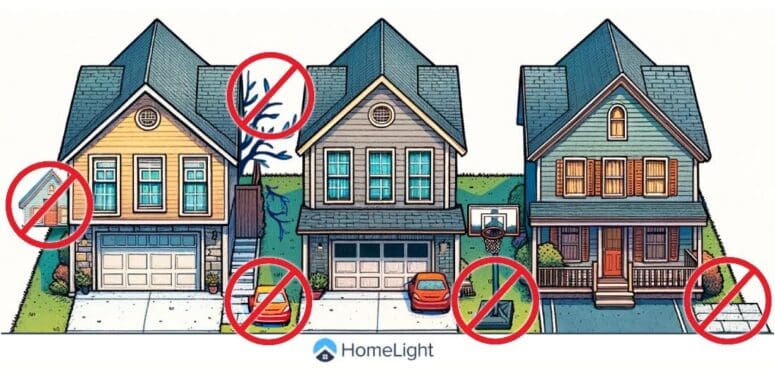Property Encroachment: What It Means to Home Sellers
- Published on
- 6 min read
-
 Richard Haddad Executive EditorClose
Richard Haddad Executive EditorClose Richard Haddad Executive Editor
Richard Haddad Executive EditorRichard Haddad is the executive editor of HomeLight.com. He works with an experienced content team that oversees the company’s blog featuring in-depth articles about the home buying and selling process, homeownership news, home care and design tips, and related real estate trends. Previously, he served as an editor and content producer for World Company, Gannett, and Western News & Info, where he also served as news director and director of internet operations.
If you’re a homeowner or planning to sell your home in the future, property encroachment is an issue you can’t afford to ignore. It can lead to disputes and complications down the line.
Identifying and addressing encroachment early can save you from potential headaches, legal battles, and devaluation of your property.
What is property encroachment?
Property encroachment occurs when a person unlawfully extends their property or objects onto another person’s land. This could involve structures, fences, driveways, or even overhanging tree branches.
Entering or crossing over your property without permission can also be considered property encroachment. If left unaddressed, encroachment can lead to disputes between neighbors, legal issues, lower property values, and reduced sale prices.
Encroachments vs. easements
Understanding the difference between encroachments and easements is helpful when identifying potential property boundary or use issues. Here’s a quick comparison to help clarify these concepts:
| Encroachment | Easement |
| Unauthorized extension onto another’s property | Legal right to use another’s property for a specific purpose |
| Often leads to disputes | Usually established through agreements or deeds |
| Can decrease property value | Typically does not affect property value |
Examples of property encroachment
Minor encroachments
- Tree branches: Overhanging branches from a neighbor’s tree can invade your property.
- Landscaping or gardens: Neighbors’ plants or gardens that cross property lines.
- Fruits falling in your yard: Apples, pears, or nuts from a neighbor’s tree falling into your yard.
- Parking on your side of the driveway: A neighbor’s vehicle is parked or blocking your side of a shared driveway.
- Basketball hoop: A hoop placed in such a way that the play area extends onto your property.
Major encroachments
- Structure: A part of a building, such as a garage or shed, built over the property line.
- Driveway: A driveway extending onto your property.
- Fence: A fence built on your land rather than on the property line.
- Drainage: Water runoff systems that direct water onto your property.
- Not honoring a setback: Construction that does not respect legal setback requirements from the property line.
How can encroachment affect your property or home sale?
Encroachments can have significant impacts on your property and its future sale. Here are some of the key issues that can arise:
- Title issues: Encroachments can create legal complications with your property title, making it difficult to transfer ownership.
- Liability issues: You could be held liable for injuries that occur on the encroached area, even if it’s technically your neighbor’s property. For example, if someone is hurt on your land by a neighbor’s falling tree branch.
- Safety issues: Encroachments, such as improperly maintained structures, can pose safety hazards.
- Property damage: Unstable structures, poorly designed landscaping, or trespassing traffic encroachments can result in damage to your property, leading to costly repairs.
- Reduced livable space or grounds: Encroachments such as a misplaced fence or shed can reduce the usable space on your property.
- Forfeiture of rights: If an encroachment is not addressed, your neighbor might gain a legal right to use that part of your property. (More on this below.)
- Impact on curb appeal: Visible encroachments can detract from the aesthetic appeal of your home.
- Frighten away buyers: Potential buyers might be discouraged by existing encroachments and the complications they can bring.
- Lower property value or sale price: Encroachments can decrease the market value of your property, leading to a lower sale price.
Ways to resolve a property encroachment
Addressing a property encroachment promptly can prevent things from getting out of hand and disrupting your life or home sale. Here are several ways to resolve encroachments, going from mild to severe:
- Speak directly to your neighbor: Start by discussing the encroachment with your neighbor to find a mutually agreeable solution.
- Use a mediator or arbitrator: If direct communication doesn’t work, a neutral third party can help mediate the dispute.
- Sell an easement on your land: Granting an easement allows your neighbor to use the encroached area legally, typically in exchange for compensation.
- Sell part of your property: Selling the encroached section to your neighbor, such as a side border road, can permanently resolve the issue.
- Take legal action: As a last resort, you can pursue legal action to remove the encroachment, though it’s better to avoid this if possible.
In addition, knowing your property lines and boundaries is important, even if you’re not planning to sell your home anytime soon. To ensure accurate boundaries, review your original plans and purchase documents.
Depending on your situation, you may want to commission a land survey. According to Angi, the average cost to survey a property is about $543.
Preserving goodwill vs. protecting your investment
Most homeowners strive to be good neighbors, often tolerating or overlooking minor property encroachments. You might have learned to live with a neighbor’s fence slightly crossing the property line or their tree branches hanging over your yard. While these issues may not bother you, potential buyers might see them differently.
Preserving goodwill with your neighbor is important, but you also need to protect your investment. Ignoring encroachments can lead to serious consequences, such as:
- Prescriptive easement: If your neighbor uses your land openly and continuously for a certain period, they may gain the legal right to continue using it.
- Gaining title by adverse possession: In some cases, if a neighbor occupies part of your property long enough without your permission, they could legally claim ownership of that portion.
In short, prolonged encroachment can lead to forfeiture of your property rights over the encroached area.
Don’t delay addressing a property encroachment
Addressing property encroachments promptly can protect your rights to enjoy your land and avoid complications during a home sale. By resolving these issues early, you protect your property’s value and make it more appealing to potential buyers.
A top local real estate agent can help you identify and address encroachment issues, ensuring a smooth selling process.
Even if you’re not selling your home right now, an experienced agent will have an established network of trusted land surveyors, appraisers, inspectors, and other professionals who can assist you.
HomeLight’s free Agent Match platform can connect you with a top-rated agent in your market. We analyze over 27 million transactions and thousands of reviews to determine which agent is best for you based on your needs.
Header Image Source: (shadowfirearts/ Pixabay)



